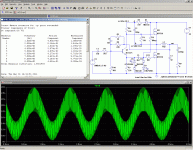So, you thought it was impossible to do simpler than 4 transistors?
Here is the 3 transistor version.
OK, performances are a bit on the weak side, but it's just the beginning, and I am sure that you, clever guys, will better that.
Note that this one has only been tested in sim (so far).
And as a bonus, it uses only N-channel MOSFETs: not even necessary to perform a transgender operation.
Here is the 3 transistor version.
OK, performances are a bit on the weak side, but it's just the beginning, and I am sure that you, clever guys, will better that.
Note that this one has only been tested in sim (so far).
And as a bonus, it uses only N-channel MOSFETs: not even necessary to perform a transgender operation.
Attachments
That's upstream of the output coupling capacitor, obviouslyDC component 16.81!! watch it
u can try with breadboard, try to measure it. I`ll also trying to simulate ur circuit, let see if the mosfet heat or not.
Love the simplicity. 🙂
I can't help wondering if there's a way to clean it up (improve performance) and still keep the kiss approach?
I can't help wondering if there's a way to clean it up (improve performance) and still keep the kiss approach?
I have tried to physically test it, but this one is a disappointment: it doesn't work as in the sim.
The self-oscillation isn't strong and healthy enough, which means the circuit takes a huge quiescent current (1.6A), and as a result, the transistors become boiling hot in a matter of seconds.
OK, maybe it has something to do with the breadboarding, which is not ideal for this kind of circuits, but the other one worked without problem in the same conditions.
The self-oscillation isn't strong and healthy enough, which means the circuit takes a huge quiescent current (1.6A), and as a result, the transistors become boiling hot in a matter of seconds.
OK, maybe it has something to do with the breadboarding, which is not ideal for this kind of circuits, but the other one worked without problem in the same conditions.
- Status
- Not open for further replies.
- Home
- Amplifiers
- Class D
- UcD on half a shoestring
